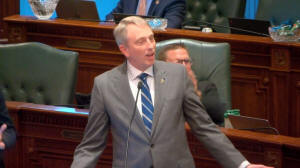|
The record-high $55.2 billion Illinois state budget includes
dozens of six and seven-figure line items for a variety of NGOs
with a wide range of missions.
Organizations slated to receive state taxpayer funds include
churches, ethnic and cultural centers, healthcare entities,
organized labor, municipal chambers of commerce, neighborhood
groups and others.
State Rep. Patrick Windhorst, R-Metropolis, said two things come
to mind with these appropriations.
“One is transparency. What are the funds being spent for, what
is the purpose of the funds, who are the funds being sent to and
what is used in the funds? And then accountability, are the
funds being spent for their intended purpose?” Windhorst told
The Center Square.
Windhorst said he does not believe the state has guardrails to
ensure good stewardship of taxpayer dollars. He said issues have
arisen in the past, including one case about a decade ago.
“We had the issue of money being appropriated that was just
essentially passed out on the street to people under the guise
of neighborhood protection,” Windhorst said.
The Pat Quinn-era Neighborhood Recovery Initiative program doled
out tens of millions of dollars to nonprofit anti-violence
groups throughout the state over several years before the 2014
election. An investigation found little grant oversight and lots
of waste.
More recently, Windhorst said he served on a crime-reduction
task force which made an effort to make sure entities used
grants to achieve their intended purpose.
“I found that exercise to be helpful, but there was really no
follow up afterward to hold people accountable for how they were
spending the money, at least not in any way that I was involved
with. If there was anything that occurred, it occurred only with
the majority party behind closed doors,” Windhorst said.
Windhorst said legislators should make sure the state’s
expenditures are actually necessary, given the tough budget
status in Illinois.
|
|




